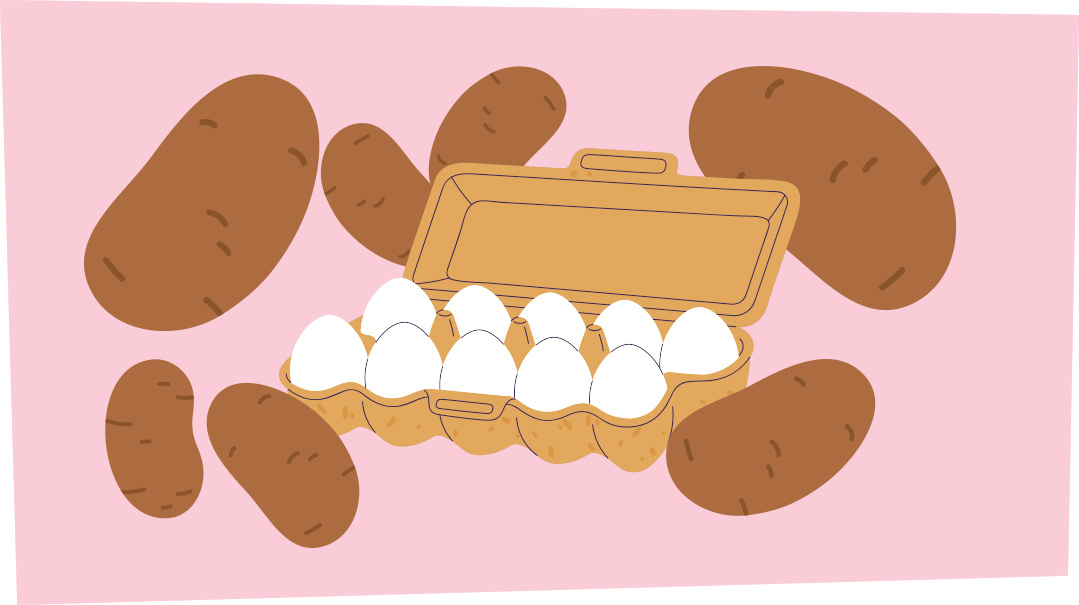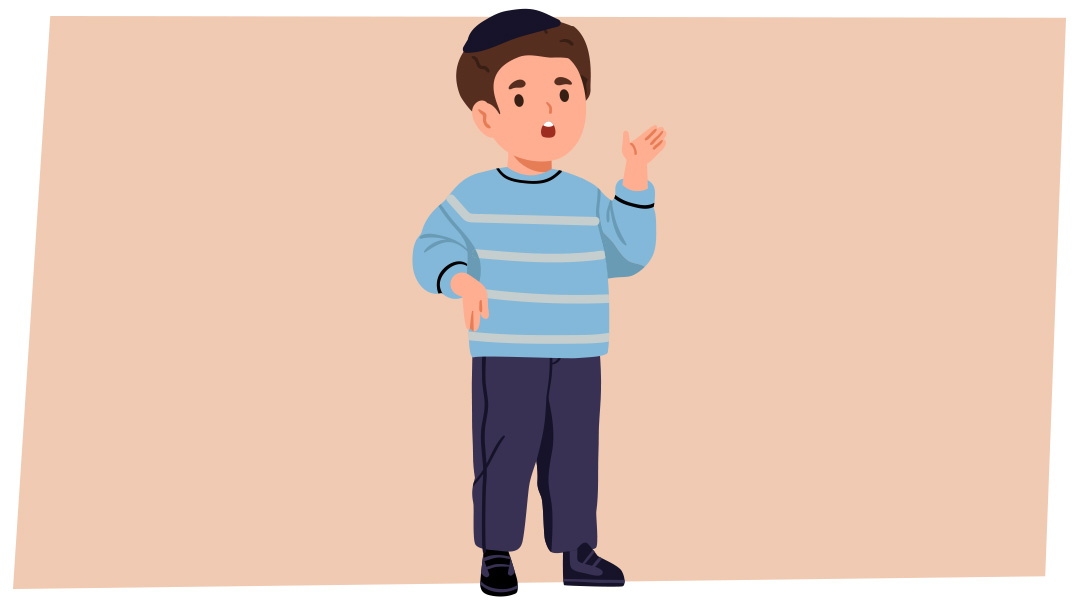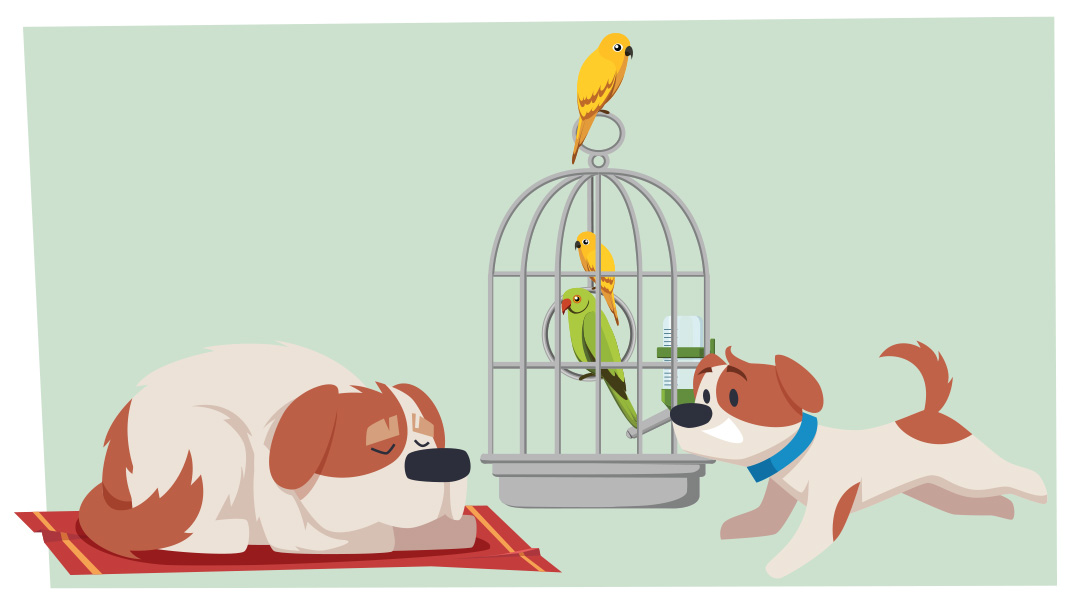The Traditional Pesach Menu: Before, During, and After

It’s like a conglomeration of the years of plenty and the years of hunger. There’s nothing, nothing to eat, and yet, there are egg kichels

Yes, we’re mainly talking potatoes and eggs. And yet.
Kol dichfin….
If food is the pulse of home, in a Jewish home, Pesach food is its very essence. True, Pesach only lasts eight days, but somehow, perhaps because our nation’s existence is fundamentally rooted in this Yom Tov, and also because your family doesn’t sell actual chometz, doesn’t mish on Pesach, but does have strong Hungarian taste buds, the entire year revolves around those sacred eight days.
Growing up, you sat over a plastic table cover a week before Pesach cracking walnuts, almonds, and hazelnuts until your pinkies bled. You squeezed a case of oranges and watched deceivingly tall cakes sink lower and lower as they cooled.
And through it all, you hunted for food.
In keeping with tradition, here’s what you and your brethren (and offspring) are wont to eat before, during, and after this Festival of Freedom.
Before
It’s like a conglomeration of the years of plenty and the years of hunger. There’s nothing, nothing to eat, and yet, there are egg kichels.
So. Many. Egg kichels. Seven boxes, to be precise, because someone had bought eight boxes for Masha Necha’s kiddush, but then the herring froze over in the too-cold fridge, so less than one box was consumed.
There are also salt-free pretzels, an accidental purchase made in November, and sardines, which aren’t chometz, but which sat in the pantry among pretzel crumbs. If you don’t get rid of them now, you never will.
So Pesach inches closer, and between frantically making sure everyone’s new robes are hemmed and all the girls have enough tights for eight days, you designate one of the millions of boxes from the Pesach order as the chometz box.
It contains:
Egg kichels
Egg kichels
Five more boxes of egg kichels
Come on, maybe with some of the custard you bought for the Chanukah doughnuts you never ended up making?
It also has a three-quarter-full box of Fiber One, the first quarter of which was consumed by an enthusiastic post-Succos dieter, whose enthusiasm died before the end of October. And a loaf of marble cake that isn’t stale, you promise, but somehow everyone thinks if they wait a little longer it will taste fresher. (You don’t offer it to your cleaning help, because for some reason, you suspect it may be a chillul Hashem.)
Then there are Oodles — sefer Torah ones from Simchas Torah, dreidel ones from Chanukah, and clown ones from Purim. Of course, they’re not chometz, but they’re in the chometz box for the same reason as the sardines, only with Oodles, you know they’ll be replenished over the coming year, and how many years’ collections of Oodles can one family need? Does any kid in the world even like Oodles?
Shabbos Hagadol arrives, and to everyone’s disbelief, the kokosh cake, which has been hidden in the deep recesses of the freezer since your Tishah B’Av baking spree, comes out. (Everyone knows how much better kokosh cake tastes with freezer burn.)
Now you practically ply your kids with the chocolaty stuff. Eat and enjoy, sheifeleh. On the porch! Shake off your clothing before you come in, wash your hands and face as soon as you’re done, and yes, do offer a slice to Tzirela Abramowitz from next door, but she should eat it on her own porch, thanks. Wait, who gave you SNACKERS? Tzirela’s mother?!?! Is she nuts?
At the seudah, you serve the challah from the batch you’d forgotten to put salt in, and if anyone would like dips, well, there’s plenty of custard. You allow three kneidlach per person, because you’d recently made a double batch without realizing how many bags you still had in the freezer. Surprisingly, there are no takers.
Motzaei Shabbos, you defrost the last pan of holopches. There are after-dinner mints from Minzers’ shalach manos for dessert, for those who eat up.
Seriously, there’s so much food; why is everyone complaining that there’s nothing to eat?
“We want real food,” they whine. It’s okay to feel a little smug. This is the same they who turn their noses up on the suppers you regularly toil over. Maybe if you serve egg kichels for a week straight, you’ll have customers for your boring chicken-on-the-bone.
Of course, there is lots of tantalizing, delicious, fresh, real food around. The smell of roast beef and caramelized onions and apple kugels and nut cakes waft through the house, but no, nobody should dare think of it. Pesach food is for Pesach, and until then, you may either starve or eat egg kichels. On the porch.
Be prudent, kids. Stand around when the blintzes crepes are being fried. Some of them are bound to get ruined, and you want to be the first to grab the castoffs.
During
At last, Erev Pesach is upon you. The last of the egg kichel is scorched in the fire (along with your post-toddler’s pacifier), and the first egg-and-potato starch-coated schnitzel comes out of the pan. The first slice of kugel is hungrily devoured, the first containers of homemade chrein and coleslaw, made with kohlrabi and heimish mayonnaise, are emptied. This meal is followed by rave reviews, spelled, “Seconds, please.”
After an entire container of compote disappears, you grow a little worried. Their appetites are on steroids. It’s like they haven’t eaten in weeks. Yom Tov hasn’t even started yet. Did you prepare enough food for all eight days?
You re-label some of the crinkle cookies and almond clusters “sautéed onions” and hide them in the back of the freezer, for fear that none will remain for second days. You even hide your heimish, Pesachdig egg kichel, marveling at the irony.
Finally, the Seder begins. All the food is comfortably nestled on the blech, the soup and the chicken and the kugels, and on top of the towel that covers your neat arrangement rests the first bag of eyer lokshen. Grape juice is drunk (and spilled), matzah is crunched (and rained over the gleaming floor). Marror is swallowed between hasty slurps of lukewarm seltzer, then matzah and marror are sandwiched together, and after that — zeicher l’Korban Chagigah — hard-boiled eggs are dipped in salt water, passed around, and oddly enjoyed by all.
And now, Shulchan Oreich, your moment to shine.
You start by serving the faltche fish, (a new recipe this year!) and the few people who actually like faltche fish tell you it’s really good, just like every year. So much for new recipes.
You move along to the soup. The clock moves along as well. It’s almost chatzos. “Could we hurry?” the Rosh HaSeder asks with what’s supposed to sound like patience.
You serve the soup as quickly as you can. By the time the last bowl makes it to the table, the first bowls are empty, and you’re asked to just, “Serve a very small piece, quickly, no dessert, we have six minutes to go.”
You serve quickly, but nobody eats — they’re either too tired, or too full of matzah and grape juice, or too wired about the upcoming afikomen bartering — and you realize that you have enough food for tomorrow night’s Seder.
Great. Really great.
What’s not so great is that over the ensuing days, the initial excitement for egg-and-potato starch egg kichel, egg-and-potato starch eyer lokshen, and egg-and-potato starch cake, cookies, schnitzel, knishes, kugels and patties wears off.
Then it’s Acharon shel Pesach. Your mishing rights are returned and everyone indulges in potato chips and chocolate leaves — but you somehow face a freezer fully stocked with Pesach foods.
Where have the Erev Pesach appetites gone?
Once again, you try to force-feed egg kichels.
With avocado?
With eggs?
Maybe with some of the heimish kohlrabi coleslaw?
Faltche fish sauce?
You’re left with seven containers of egg kichels, labeled meat gravy.
After
The second Yom Tov is out, a strange thing happens.
The whole entire family becomes allergic to any food that’s kosher l’Pesach.
The same food you protectively hovered over just a week ago now sits forlorn on your freezer shelves. And the same food you discarded only eight days ago is embraced with love reserved for broken blintzes crepes.
There’s so much food in the house, and yet, once again, there’s nothing to eat.
“We want real food,” they whine.
Real food, this time around, means pizza. The same pizza they turned their noses up at every night of Chodesh Nissan. Maybe if you serve pizza for a week straight, they’ll beg you for egg kichel?
Leftover faltche fish aside, you do need to stock up on chometz groceries. For this, you recruit your brave husband. He grumbles, but you know good and well how much fun the guys have in the grocery, grabbing piping-hot, half-raw bagels before they have a chance to reach the shelves. Also, if he’s in the grocery he won’t be home, and who in his right mind wants to be home the night you’re un-turning over?
So you bark out a list of staples (everything except eggs and potatoes), plus all the items you know won’t be made fresh until Shavuos, and as per your minhag, must therefore be purchased from stock that you know your grocer had sold over Pesach.
All men whose families hold of this minhag arrive at the grocery with the same list. It includes: croutons, soup mandels, Super Snacks, Kemach X-fine noodles, angel hair pasta, spaghetti, flat breads, and kneidel mix.
Three hours later, when your husband safely assumes that the Pesach keilim have been packed away, he returns.
With fingers scented by eau de Soft Scrub, you peek into the bags. First thing you notice are the items that are missing.
“Flat bread?” you ask.
“They didn’t have.”
“Soup lokshen — extra fine??”
“I didn’t see.”
“Bread?”
“They were out of it.”
You don’t ask about the croutons, figuring you’ll just have to take soup off the menu until Shavuos.
Then you notice the items he actually did buy. They include:
Salt-free pretzels.
Fiber One.
Snackers.
Oodles. (“They were on special!”)
And egg kichels, freshly baked after Passover.
(Originally featured in Family First, Issue 838)
Oops! We could not locate your form.







